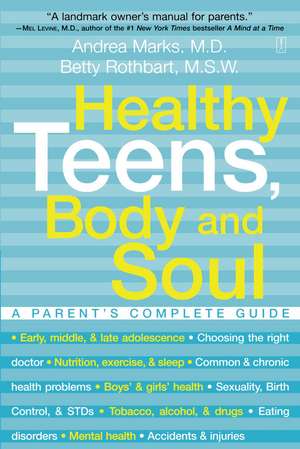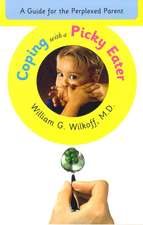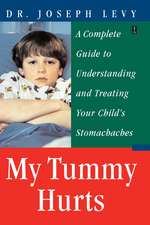Healthy Teens, Body and Soul: A Parent's Complete Guide
Autor Andrea Marks, Betty Rothbarten Limba Engleză Paperback – 4 feb 2003
Andrea Marks, M.D., and Betty Rothbart, M.S.W., take a unique approach -- they focus on the interplay of physical, mental, emotional, and social issues that make these years such a challenging time. They show how physical health concerns must be considered within the context of the three main goals of adolescence:
• gaining independence
• clarifying sexual identity
• Finding a realistic, satisfying place in society
Combining authoritative information with sound advice on communicating with teens, who really do want and need their parents' help (even though at times it may seem otherwise), Healthy Teens, Body and Soul will teach parents how to open the lines of communication that will result in healthier, happier teens (and parents!).
Preț: 96.09 lei
Nou
Puncte Express: 144
Preț estimativ în valută:
18.39€ • 19.13$ • 15.18£
18.39€ • 19.13$ • 15.18£
Carte disponibilă
Livrare economică 24 martie-07 aprilie
Livrare express 08-14 martie pentru 29.21 lei
Preluare comenzi: 021 569.72.76
Specificații
ISBN-13: 9780743225618
ISBN-10: 0743225619
Pagini: 384
Ilustrații: 3 b-w illustrations
Dimensiuni: 152 x 229 x 23 mm
Greutate: 0.47 kg
Ediția:Original
Editura: Touchstone Publishing
Colecția Touchstone
ISBN-10: 0743225619
Pagini: 384
Ilustrații: 3 b-w illustrations
Dimensiuni: 152 x 229 x 23 mm
Greutate: 0.47 kg
Ediția:Original
Editura: Touchstone Publishing
Colecția Touchstone
Notă biografică
Andrea Marks, M.D., a specialist in adolescent medicine, directed academic programs before opening a private practice for patients ages 9 to 30. She is on the faculty of The Mount Sinai School of Medicine, and also writes a monthly column, "Ask Dr. Marks," for Cosmo Girl magazine. Dr. Marks will be President of the Society for Adolescent Medicine in 2004.
Cuprins
Contents
Introduction
Chapter 1 The Stages and Tasks of Adolescent Development
What to Do About the Fears
Defining Adolescence
The Tasks of Adolescence
Early Adolescence:
Ages 10 to 14 -- the Middle School/Junior High Years
Health-Partnering in Early Adolescence
Middle Adolescence:
Ages 15 to 18 -- the High School Years
Health-Partnering in Middle Adolescence
Late Adolescence:
Ages 18 to 21 -- the Years After High School
Health-Partnering in Late Adolescence
Health-Partnering Tips for Parents
Chapter 2 A Doctor of Their Own
A Unique Set of Health Risks
Building Trust
Talking About Values
A New Role for Parents
Your Teen in the Driver's Seat
Stay with the Pediatrician or Find a New Doctor?
An Office with Teen Appeal
The First Visit
Information Parents Provide
Meeting the Teen
The Doctor-Teen Dialogue
Bringing the Full Team Together
Privacy and Confidentiality
Frequency and Scope of Visits
The Adolescent Checkup
The Physical Examination
Laboratory Tests
Immunizations
Adolescents as Medical Consumers
Overcoming Barriers
A Medical Consumer Prepares
Urgent Symptoms
An Ongoing Relationship
Health-Partnering Tips for Parents
Chapter 3 The Basics: Nutrition, Exercise, and Sleep
Health Basic #1: Nutrition
Growth Spurts in Weight and Height
A Healthy Weight Gain
The Nutrients Your Adolescent Needs
Vitamins and Minerals: Via Nature or Supplement?
Nutrition Labels
Water
Vegetarian Teens
Breakfast, a Brilliant Idea
Health-Partnering for Nutrition
Health Basic #2: Exercise
An Epidemic of Obesity
Exercise Can Heighten the Joy of Living
At the Computer, Hours of Sitting Still
ard
At School: More Sitting
Advocating for Improved Physical Education
Three Forms of Fitness
Health-Partnering for Exercise
Health Basic #3: Sleep
Adolescents' Sleep Needs
When Sleep Needs Are Not Met
Healthy Sleep Patterns
When High Schools Wake Up
Insomnia
Sleep Disorders Associated with Excessive Sleep
Health-Partnering for Sleep
Chapter 4 Common Health Problems of Girls and Boys
Illness in Context
The One Best Way to Prevent Illness
How and When to Wash Hands
Washing Hands in School
Washing Hands at Home
Body Odor and Other Hygiene Matters
Hygiene or Style?
Skin and Hair
Acne
How to Talk with an Adolescent About Acne
How Does Your Teen Deal with Having Acne?
How Can You Help? Ask Your Child
What to Do About Acne
How Can Acne be Treated?
Dry Skin
Tough Guys in Winter
Dermatitis
Contact Dermatitis
Eczema (Atopic Dermatitis)
Seborrheic Dermatitis
Suntans are "Skinjury"
Piercing and Tattoos
Hair Loss
Eyes
Vision Testing
Eye Ailments
Eye Care
Ears
Oral Health
Dental Caries
Bad Breath (Halitosis)
Gum Disease
Braces
Braces Pay Off, But You Might Have to Pay
Special Care Protects Braces
When Braces Come Off
The Basics of Oral Care
Helping Your Adolescent Stay Motivated
Respiratory Problems
Colds
Sinusitis and Otitis Media
Bronchitis
Pneumonia
Flu
Meningitis
Infectious Mononucleosis
Gut Feelings
Constipation
Diarrhea
Persistent Symptoms and Irritable Bowel Syndrome (IBS)
Promoting Healthy Digestion
Enuresis and Encopresis
Bed-wetting (Enuresis)
Encopresis
Scoliosis
Diagnosing Scoliosis
Treatment
Back Pain
Headaches, Dizziness, Fatigue
Tension Headaches
Migraine Headaches
Dizziness
Fatigue
Chronic Fatigue Syndrome
Health-Partnering Tips for Parents
Chapter 5 Health Issues for Your Daughter
The Puberty Experience for Girls
Tanner Stages for Girls, and Related Changes
Learning About the Female Body
Why Your Daughter Needs to Learn How Her Body Works
She Can See for Herself
External Genitalia
Internal Organs
Anatomical Differences Between Adolescent Girls and Women
The Menstrual Cycle: Preparation, Release, Renewal
Preparation
Release
Renewal
Some Things About Menstruation Your Daughter Should Know
Pad or Tampon?
Toxic Shock Syndrome and Safe Tampon Use
Menstrual Concerns and Disorders
Cranky and Crampy: Premenstrual Syndrome
Cramps and Dysmenorrhea (Painful Menstruation)
Primary Dysmenorrhea
Treatment of Menstrual Pain
Secondary Dysmenorrhea
Amenorrhea
Primary Amenorrhea
Secondary Amenorrhea
The Female Athlete Triad
She'll Feel It in Her Bones
Trapped in the Triad
Dysfunctional Uterine Bleeding
Vaginal Hygiene and Health
Vaginal Discharge: Signs of Puberty and Ovulation
Vulvovaginitis
Bacterial Vaginitis
Yeast Infection
Gardnerella Vaginalis
Trichomoniasis
Urinary Tract (Bladder and Kidney) Infections
Common Infections -- Especially Among Women
Why Urinary Tract Infections Occur
Seek Help Promptly
How to Prevent Urinary Tract Infections or Recurrence
Breast Concerns and Disorders
Breast Self-Exam
Visual Inspection
Palpating (Feeling) the Breasts
Her First Gynecologic Exam
Body Image: Help Your Daughter Accept Herself
Health-Partnering Tips for Parents
Chapter 6 Health Issues for Your Son
When Does Puberty Begin?
Tanner Stages for Boys, and Related Changes
How the Male Body Works
The Male Genitalia
Why the Scrotum Contracts and Relaxes
Two Perils of Tight Jeans
Explaining Erections
Wet Dreams
The Myth of "Blue Balls"
Retrograde Ejaculation
Hematospermia
The Role of Preseminal Fluid
Testicular Cancer and the Importance of Self-Exams
Testicular Self-Exam
Scrotal Disorders
Testicular Torsion
Warning Signs of Testicular Torsion
Epididymitis
Warning Signs of Epididymitis
Orchitis
Varicocele
Inguinal Hernia
Hydrocele
Spermatocele
Trauma
When to See a Doctor After Testicular Trauma
Cryptorchidism
Testicular Implant
Underdeveloped Testicles
Penile Hygiene and Disease Prevention
Cleaning Under the Foreskin
Phimosis and Paraphimosis
Balanitis
Symptoms of Balanitis
Tinea Cruris ("Jock Itch")
Penile Disorders
Pink Pearly Papules
Hypospadias and Epispadias
Priapism
Impotence
Urethritis
Symptoms of Urethritis
Gynecomastia
Health-Partnering Tips for Parents
Chapter 7 Coping with Chronic Health Problems
Chronic Health Problems Differ
Health Coping Skills
Adolescent Task #1: To Gain Independence
Levels of Help from a Medical Support Team
Support Groups and Mentors
Baby Steps Add Up
The Urge to Rebel
0
Independence of Mind
Adolescent Task #2: To Clarify Sexual Identity
An Unseen Disease
The Naked Truth
Visibly Different
Mature Body, Childlike Mind
Adolescent Task #3: To Explore Societal Role and Self-Image
Just Another Set of Habits
Accommodations and Alternatives
Translating Disability into Passion
In the Shadows: Depression and Unsafe Behaviors
Depression
Substance Abuse
Risk-Taking Sexual Behavior
Poor Compliance with Health Care
Family Stress
Exploring the Possible
"UnpredictAbility"
Health-Partnering Tips for Parents
Arthritis
Asthma
Cancer
Diabetes Mellitus
Epilepsy (Seizure Disorders)
Inflammatory Bowel Disease (IBD)
Chapter 8 Risks and Realities of Teen Sexuality
A Sexualized Culture
The Importance of Parents' Voices
Sexuality: An Integral Part of Life
Adolescents' Sexuality Issues
Gender Identity
A Parent's Perspective
Sexuality and Decision Making
A Parent's Perspective
Forming Healthy Relationships
Timing
Staying Busy
Living a Well-Rounded Life
Masturbation
A Parent's Perspective
Sexual Limit Setting
A Parent's Perspective
Sexual Orientation
A Parent's Perspective
Sexually Transmitted Diseases
A Parent's Perspective
STD Symptoms
Some Sexually Transmitted Diseases Your Teen Must Know About
Condoms
Correct Condom Use
Words That Keep You Safer
Contraception
A Parent's Perspective
The Most Common Contraceptive Choices for Adolescents
The Morning-After Pill/Emergency Contraception
If Pregnancy Occurs
Health-Partnering Tips for Parents
Chapter 9 No Teen Is Immune: Substance Use and Abuse
Why Adolescents Use
Talking with Teens About Abstaining
Connected Adolescents Abstain or Wait
Not Everyone Is Using
Abstinence versus "Harm Reduction"
Tobacco
Cigarettes as Social Accessory
Effects of Smoking, Now and Later
Bidis, Cigars, and Smokeless Tobacco Are Risky, Too
Quitting the Tobacco Habit
How Parents Can Help
Tobacco as a Gateway Drug
Alcohol
Alcohol and Health
Legal and Lethal: Drinking and Driving
You Don't Have to Stumble
Help for the Adolescent Problem Drinker
Illicit Drugs
Marijuana
Help for the Adolescent Marijuana Smoker
Inhalants
Help for the Adolescent Inhalant User
Stimulants
Amphetamines
Cocaine
Help for the Adolescent User of Stimulants
Hallucinogens and Club Drugs
Ecstasy
Rohypnol
GHB
Ketamine
LSD
Help for the Adolescent User of Hallucinogens
Opiates
Help for the Adolescent User of Opiates
Anabolic-Androgenic Steroids
Help for the Adolescent User of Steroids
Signs of Drug and Alcohol Use
Health-Partnering Tips for Parents
Chapter 10 Panic at the Mirror: Teens and Eating Disorders
Eating Disorders and the Hazards of Thinness
The Runaway Body
Rich Fashion Models, Poor Role Models
The Lost Aesthetic of Body Diversity
Family and Peer Pressures
Peers and Community Play a Role
Anorexia Nervosa
Anorexia Nervosa: Both Defining and Threatening Life
Diagnosing Anorexia Nervosa
Health Risks of Anorexia Nervosa
Laboratory Tests
Treatment of Anorexia Nervosa
Through Treatment, a New Direction
Bulimia Nervosa
Hidden Rituals
Diagnosing Bulimia Nervosa
Health Risks
Treatment
Binge-Eating Disorder
Eating Disorders "Not Otherwise Specified"
Overeating to Obesity
Obesity as a Social Hardship
Is It "Baby Fat" or Obesity?
Diets Are a Detour
Reveal Remedies by Identifying the Causes
A Weight-Loss Coach
Reshaping Habits
A Parent's Words
Setting Realistic Goals
Health-Partnering Tips for Parents
Chapter 11 Your Teen's Mental Health
The First Step: Seeing Mental Health in Context
Common Family Stresses
Illness or Death of a Family Member
Parents' Unemployment or Financial Problems
Abusive or Substance-Abusing Parents
Parental Conflict, Separation, or Divorce
Common School Stresses
Overwhelming Academic Demands
Problems with Peers
School Phobia
Common Stresses with Peers
Loneliness
Peer Pressure
Teasing and Bullying
Heartache
Dating Abuse
Therapies and Therapists
When Adolescents Resist Therapy
Learning Disabilities and Attentional Disorders
Learning Disabilities
Attention Deficit Disorder
Advocating for Your Child at School
Mental Illness in Adolescents
Mood Disorders
Depression
Bipolar Disorder
Suicide
Self-Injury
Oppositional Defiant Disorder
Anxiety Disorders
Generalized Anxiety Disorder
Panic Attacks and Panic Disorder
Post-Traumatic Stress Disorder (PTSD)
Obsessive-Compulsive Disorder (OCD)
Schizophrenia
Seeking Help
Health-Partnering Tips for Parents
Chapter 12 Preventing Accidents and Injuries
An Urgent Need for Prevention
Conveying the Safety Message
Evading Emergencies
Six E's for Effective Communication with Your Teen
Preventing Sports Injuries
First Step: Get Your Doctor's Go-Ahead
rCheck Out the Game, Gear, and Clothes
Warm Up and Cool Down
Stay Cool
Avoid Steroids and Other Performance-Enhancing Drugs
Safety on the Job
Driving Safety
Hell on Wheels
Learning to Drive
Auto Attitude
Steps for Keeping Your Young Driver Safe
How to Be a Healthy Driver
Car Care and Emergency Preparedness
Family Driving Rules
Violence and Adolescent Life
Seeds of Violence
Protecting Teens
Coping with Injury
Health-Partnering Tips for Parents
Conclusion
Notes
Bibliography
Books for Teens (and Their Parents)
Resources
Hot Lines and Related Websites
Index
Introduction
Chapter 1 The Stages and Tasks of Adolescent Development
What to Do About the Fears
Defining Adolescence
The Tasks of Adolescence
Early Adolescence:
Ages 10 to 14 -- the Middle School/Junior High Years
Health-Partnering in Early Adolescence
Middle Adolescence:
Ages 15 to 18 -- the High School Years
Health-Partnering in Middle Adolescence
Late Adolescence:
Ages 18 to 21 -- the Years After High School
Health-Partnering in Late Adolescence
Health-Partnering Tips for Parents
Chapter 2 A Doctor of Their Own
A Unique Set of Health Risks
Building Trust
Talking About Values
A New Role for Parents
Your Teen in the Driver's Seat
Stay with the Pediatrician or Find a New Doctor?
An Office with Teen Appeal
The First Visit
Information Parents Provide
Meeting the Teen
The Doctor-Teen Dialogue
Bringing the Full Team Together
Privacy and Confidentiality
Frequency and Scope of Visits
The Adolescent Checkup
The Physical Examination
Laboratory Tests
Immunizations
Adolescents as Medical Consumers
Overcoming Barriers
A Medical Consumer Prepares
Urgent Symptoms
An Ongoing Relationship
Health-Partnering Tips for Parents
Chapter 3 The Basics: Nutrition, Exercise, and Sleep
Health Basic #1: Nutrition
Growth Spurts in Weight and Height
A Healthy Weight Gain
The Nutrients Your Adolescent Needs
Vitamins and Minerals: Via Nature or Supplement?
Nutrition Labels
Water
Vegetarian Teens
Breakfast, a Brilliant Idea
Health-Partnering for Nutrition
Health Basic #2: Exercise
An Epidemic of Obesity
Exercise Can Heighten the Joy of Living
At the Computer, Hours of Sitting Still
ard
At School: More Sitting
Advocating for Improved Physical Education
Three Forms of Fitness
Health-Partnering for Exercise
Health Basic #3: Sleep
Adolescents' Sleep Needs
When Sleep Needs Are Not Met
Healthy Sleep Patterns
When High Schools Wake Up
Insomnia
Sleep Disorders Associated with Excessive Sleep
Health-Partnering for Sleep
Chapter 4 Common Health Problems of Girls and Boys
Illness in Context
The One Best Way to Prevent Illness
How and When to Wash Hands
Washing Hands in School
Washing Hands at Home
Body Odor and Other Hygiene Matters
Hygiene or Style?
Skin and Hair
Acne
How to Talk with an Adolescent About Acne
How Does Your Teen Deal with Having Acne?
How Can You Help? Ask Your Child
What to Do About Acne
How Can Acne be Treated?
Dry Skin
Tough Guys in Winter
Dermatitis
Contact Dermatitis
Eczema (Atopic Dermatitis)
Seborrheic Dermatitis
Suntans are "Skinjury"
Piercing and Tattoos
Hair Loss
Eyes
Vision Testing
Eye Ailments
Eye Care
Ears
Oral Health
Dental Caries
Bad Breath (Halitosis)
Gum Disease
Braces
Braces Pay Off, But You Might Have to Pay
Special Care Protects Braces
When Braces Come Off
The Basics of Oral Care
Helping Your Adolescent Stay Motivated
Respiratory Problems
Colds
Sinusitis and Otitis Media
Bronchitis
Pneumonia
Flu
Meningitis
Infectious Mononucleosis
Gut Feelings
Constipation
Diarrhea
Persistent Symptoms and Irritable Bowel Syndrome (IBS)
Promoting Healthy Digestion
Enuresis and Encopresis
Bed-wetting (Enuresis)
Encopresis
Scoliosis
Diagnosing Scoliosis
Treatment
Back Pain
Headaches, Dizziness, Fatigue
Tension Headaches
Migraine Headaches
Dizziness
Fatigue
Chronic Fatigue Syndrome
Health-Partnering Tips for Parents
Chapter 5 Health Issues for Your Daughter
The Puberty Experience for Girls
Tanner Stages for Girls, and Related Changes
Learning About the Female Body
Why Your Daughter Needs to Learn How Her Body Works
She Can See for Herself
External Genitalia
Internal Organs
Anatomical Differences Between Adolescent Girls and Women
The Menstrual Cycle: Preparation, Release, Renewal
Preparation
Release
Renewal
Some Things About Menstruation Your Daughter Should Know
Pad or Tampon?
Toxic Shock Syndrome and Safe Tampon Use
Menstrual Concerns and Disorders
Cranky and Crampy: Premenstrual Syndrome
Cramps and Dysmenorrhea (Painful Menstruation)
Primary Dysmenorrhea
Treatment of Menstrual Pain
Secondary Dysmenorrhea
Amenorrhea
Primary Amenorrhea
Secondary Amenorrhea
The Female Athlete Triad
She'll Feel It in Her Bones
Trapped in the Triad
Dysfunctional Uterine Bleeding
Vaginal Hygiene and Health
Vaginal Discharge: Signs of Puberty and Ovulation
Vulvovaginitis
Bacterial Vaginitis
Yeast Infection
Gardnerella Vaginalis
Trichomoniasis
Urinary Tract (Bladder and Kidney) Infections
Common Infections -- Especially Among Women
Why Urinary Tract Infections Occur
Seek Help Promptly
How to Prevent Urinary Tract Infections or Recurrence
Breast Concerns and Disorders
Breast Self-Exam
Visual Inspection
Palpating (Feeling) the Breasts
Her First Gynecologic Exam
Body Image: Help Your Daughter Accept Herself
Health-Partnering Tips for Parents
Chapter 6 Health Issues for Your Son
When Does Puberty Begin?
Tanner Stages for Boys, and Related Changes
How the Male Body Works
The Male Genitalia
Why the Scrotum Contracts and Relaxes
Two Perils of Tight Jeans
Explaining Erections
Wet Dreams
The Myth of "Blue Balls"
Retrograde Ejaculation
Hematospermia
The Role of Preseminal Fluid
Testicular Cancer and the Importance of Self-Exams
Testicular Self-Exam
Scrotal Disorders
Testicular Torsion
Warning Signs of Testicular Torsion
Epididymitis
Warning Signs of Epididymitis
Orchitis
Varicocele
Inguinal Hernia
Hydrocele
Spermatocele
Trauma
When to See a Doctor After Testicular Trauma
Cryptorchidism
Testicular Implant
Underdeveloped Testicles
Penile Hygiene and Disease Prevention
Cleaning Under the Foreskin
Phimosis and Paraphimosis
Balanitis
Symptoms of Balanitis
Tinea Cruris ("Jock Itch")
Penile Disorders
Pink Pearly Papules
Hypospadias and Epispadias
Priapism
Impotence
Urethritis
Symptoms of Urethritis
Gynecomastia
Health-Partnering Tips for Parents
Chapter 7 Coping with Chronic Health Problems
Chronic Health Problems Differ
Health Coping Skills
Adolescent Task #1: To Gain Independence
Levels of Help from a Medical Support Team
Support Groups and Mentors
Baby Steps Add Up
The Urge to Rebel
0
Independence of Mind
Adolescent Task #2: To Clarify Sexual Identity
An Unseen Disease
The Naked Truth
Visibly Different
Mature Body, Childlike Mind
Adolescent Task #3: To Explore Societal Role and Self-Image
Just Another Set of Habits
Accommodations and Alternatives
Translating Disability into Passion
In the Shadows: Depression and Unsafe Behaviors
Depression
Substance Abuse
Risk-Taking Sexual Behavior
Poor Compliance with Health Care
Family Stress
Exploring the Possible
"UnpredictAbility"
Health-Partnering Tips for Parents
Arthritis
Asthma
Cancer
Diabetes Mellitus
Epilepsy (Seizure Disorders)
Inflammatory Bowel Disease (IBD)
Chapter 8 Risks and Realities of Teen Sexuality
A Sexualized Culture
The Importance of Parents' Voices
Sexuality: An Integral Part of Life
Adolescents' Sexuality Issues
Gender Identity
A Parent's Perspective
Sexuality and Decision Making
A Parent's Perspective
Forming Healthy Relationships
Timing
Staying Busy
Living a Well-Rounded Life
Masturbation
A Parent's Perspective
Sexual Limit Setting
A Parent's Perspective
Sexual Orientation
A Parent's Perspective
Sexually Transmitted Diseases
A Parent's Perspective
STD Symptoms
Some Sexually Transmitted Diseases Your Teen Must Know About
Condoms
Correct Condom Use
Words That Keep You Safer
Contraception
A Parent's Perspective
The Most Common Contraceptive Choices for Adolescents
The Morning-After Pill/Emergency Contraception
If Pregnancy Occurs
Health-Partnering Tips for Parents
Chapter 9 No Teen Is Immune: Substance Use and Abuse
Why Adolescents Use
Talking with Teens About Abstaining
Connected Adolescents Abstain or Wait
Not Everyone Is Using
Abstinence versus "Harm Reduction"
Tobacco
Cigarettes as Social Accessory
Effects of Smoking, Now and Later
Bidis, Cigars, and Smokeless Tobacco Are Risky, Too
Quitting the Tobacco Habit
How Parents Can Help
Tobacco as a Gateway Drug
Alcohol
Alcohol and Health
Legal and Lethal: Drinking and Driving
You Don't Have to Stumble
Help for the Adolescent Problem Drinker
Illicit Drugs
Marijuana
Help for the Adolescent Marijuana Smoker
Inhalants
Help for the Adolescent Inhalant User
Stimulants
Amphetamines
Cocaine
Help for the Adolescent User of Stimulants
Hallucinogens and Club Drugs
Ecstasy
Rohypnol
GHB
Ketamine
LSD
Help for the Adolescent User of Hallucinogens
Opiates
Help for the Adolescent User of Opiates
Anabolic-Androgenic Steroids
Help for the Adolescent User of Steroids
Signs of Drug and Alcohol Use
Health-Partnering Tips for Parents
Chapter 10 Panic at the Mirror: Teens and Eating Disorders
Eating Disorders and the Hazards of Thinness
The Runaway Body
Rich Fashion Models, Poor Role Models
The Lost Aesthetic of Body Diversity
Family and Peer Pressures
Peers and Community Play a Role
Anorexia Nervosa
Anorexia Nervosa: Both Defining and Threatening Life
Diagnosing Anorexia Nervosa
Health Risks of Anorexia Nervosa
Laboratory Tests
Treatment of Anorexia Nervosa
Through Treatment, a New Direction
Bulimia Nervosa
Hidden Rituals
Diagnosing Bulimia Nervosa
Health Risks
Treatment
Binge-Eating Disorder
Eating Disorders "Not Otherwise Specified"
Overeating to Obesity
Obesity as a Social Hardship
Is It "Baby Fat" or Obesity?
Diets Are a Detour
Reveal Remedies by Identifying the Causes
A Weight-Loss Coach
Reshaping Habits
A Parent's Words
Setting Realistic Goals
Health-Partnering Tips for Parents
Chapter 11 Your Teen's Mental Health
The First Step: Seeing Mental Health in Context
Common Family Stresses
Illness or Death of a Family Member
Parents' Unemployment or Financial Problems
Abusive or Substance-Abusing Parents
Parental Conflict, Separation, or Divorce
Common School Stresses
Overwhelming Academic Demands
Problems with Peers
School Phobia
Common Stresses with Peers
Loneliness
Peer Pressure
Teasing and Bullying
Heartache
Dating Abuse
Therapies and Therapists
When Adolescents Resist Therapy
Learning Disabilities and Attentional Disorders
Learning Disabilities
Attention Deficit Disorder
Advocating for Your Child at School
Mental Illness in Adolescents
Mood Disorders
Depression
Bipolar Disorder
Suicide
Self-Injury
Oppositional Defiant Disorder
Anxiety Disorders
Generalized Anxiety Disorder
Panic Attacks and Panic Disorder
Post-Traumatic Stress Disorder (PTSD)
Obsessive-Compulsive Disorder (OCD)
Schizophrenia
Seeking Help
Health-Partnering Tips for Parents
Chapter 12 Preventing Accidents and Injuries
An Urgent Need for Prevention
Conveying the Safety Message
Evading Emergencies
Six E's for Effective Communication with Your Teen
Preventing Sports Injuries
First Step: Get Your Doctor's Go-Ahead
rCheck Out the Game, Gear, and Clothes
Warm Up and Cool Down
Stay Cool
Avoid Steroids and Other Performance-Enhancing Drugs
Safety on the Job
Driving Safety
Hell on Wheels
Learning to Drive
Auto Attitude
Steps for Keeping Your Young Driver Safe
How to Be a Healthy Driver
Car Care and Emergency Preparedness
Family Driving Rules
Violence and Adolescent Life
Seeds of Violence
Protecting Teens
Coping with Injury
Health-Partnering Tips for Parents
Conclusion
Notes
Bibliography
Books for Teens (and Their Parents)
Resources
Hot Lines and Related Websites
Index
Recenzii
Mel Levine, M.D. author of the #1 New York Times bestseller A Mind at a Time A landmark owner's manual for parents...
David W. Kaplan, M.D. Head, Adolescent Medicine, University of Colorado School of Medicine This is the teen health book. It is #1 on my list!
Ron Taffel, Ph.D. author of The Second Family Sure to become a reference guide on millions of shelves around the world...a must-have.
David W. Kaplan, M.D. Head, Adolescent Medicine, University of Colorado School of Medicine This is the teen health book. It is #1 on my list!
Ron Taffel, Ph.D. author of The Second Family Sure to become a reference guide on millions of shelves around the world...a must-have.
















